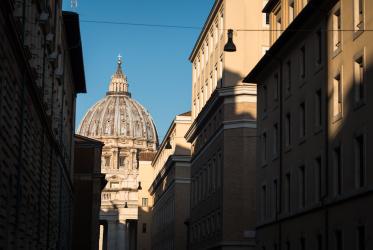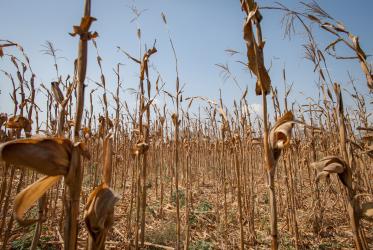Updated 23 June 2015
Statement by the WCC general secretary, Rev. Dr Olav Fykse Tveit, on the Encyclical Letter Laudato Si’ of His Holiness Pope Francis on care for our common home
Today the Encyclical Laudato Si’ has been officially launched. A much expected first letter of His Holiness Pope Francis addressed to all people (Paragraph 4). It is very significant that this first letter is dedicated to the environment, ecology, climate change and related issues, to the “care of our common home”.
This encyclical proves to all that these are matters at the heart of our Christian faith, and that we as Christians should address them together with all people who care for our common future. This is the time to focus on our shared responsibility as human beings, and the way we as churches should support those who are ready to make the required changes.
The letter addresses, in fact, one of the more important challenges of our time: the ecological crisis. This has various components, among them, climate change, the water crisis, the loss of biodiversity. As churches have said many times, climate change has to be seen as a global problem with environmental, social, economic, distributive and political implications (25). The Pope stresses the scientific consensus on global warming due to human activities (23) and reminds us we need to see climate change as a common good (23ff). He furthermore strongly proclaims that “access to safe drinking water is an essential, fundamental and universal human right” (30).
We welcome the Holy Father recognizes that “other churches and Christian communities have had a deep concern and a precious reflection” (7). The leading role His All Holiness the Ecumenical Patriarch Bartholomew has played in protecting the environment and condemning the destruction of creation as a sin is adequately reflected (7-9).
Ecology and economy are intertwined. While the debt of poor countries is many times highlighted, many times the ecological debt (51-52) is forgotten.
We share the concerns expressed by the Holy Father on the lack of progress made at the United Nations Framework Convention on Climate Change process. While on some aspects like the Basel Convention on hazardous wastes or Vienna Convention and Montreal Protocol Montreal Protocol on Substances that Deplete the Ozone Layer (168) relevant achievements can be recognized, on Climate Change Convention the progress made is regretfully very limited (169).
To address adequately to the ecological crisis the Holy Father stresses the need for dialogue between politics and economy (189-198) and religion and science (199-201). We consider these dialogues as a sine qua non condition for an effective and much needed response. Together with these dialogues, we need to change our lifestyles (203-208) as well as social and political relations (209-232).
This is a difficult call to conversion, which is at the core of the Gospel’s message. A deep spirituality of creation (233-240) can help us to undergo this process as a pilgrimage. As we, as WCC, advance in a pilgrimage of justice and peace, we feel close to Pope Francis’ message when he recalls that “we human beings are united as brothers and sisters on a wonderful pilgrimage, woven together by the love God has for each of his creatures” (92).
Geneva, 18 June 2015



